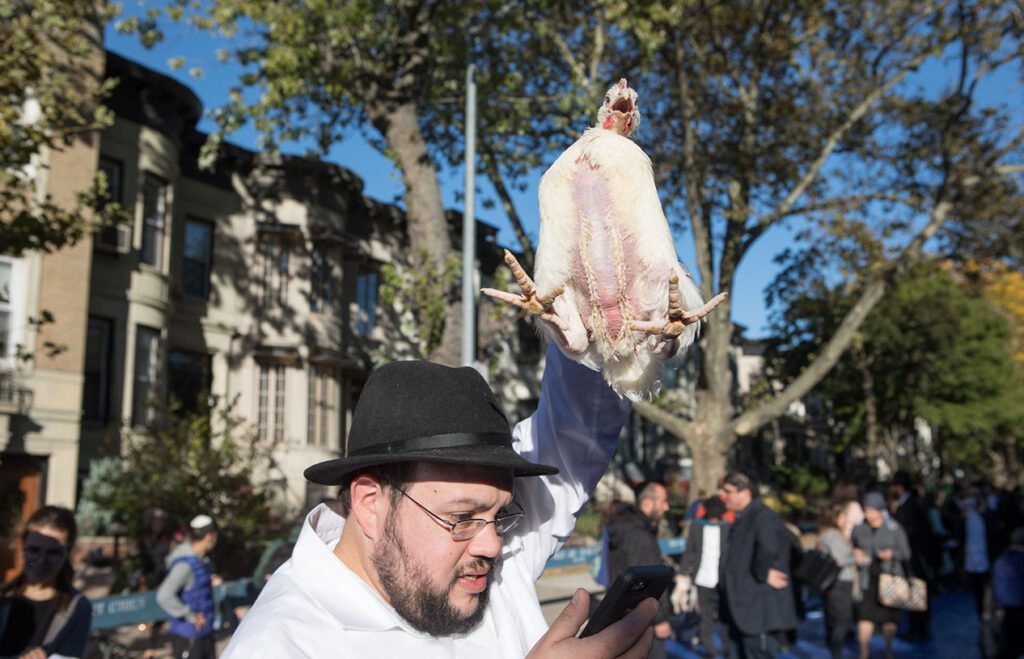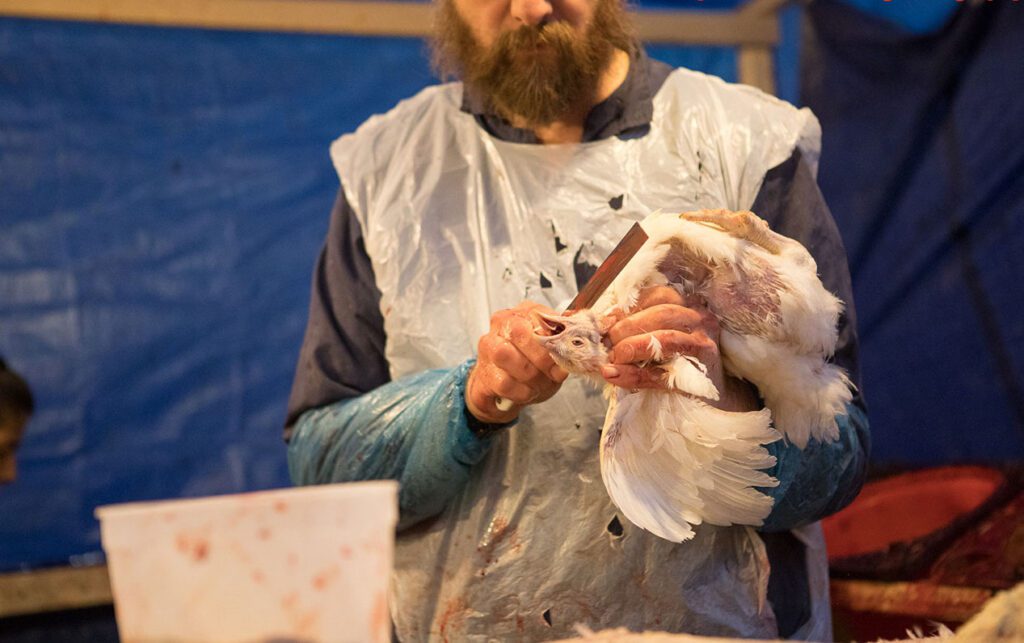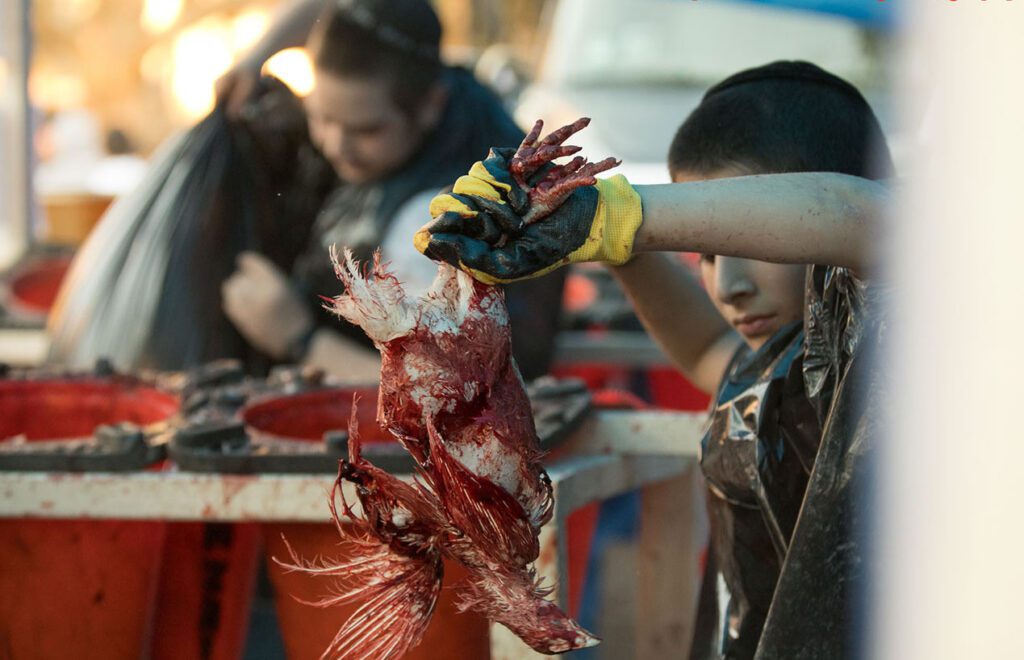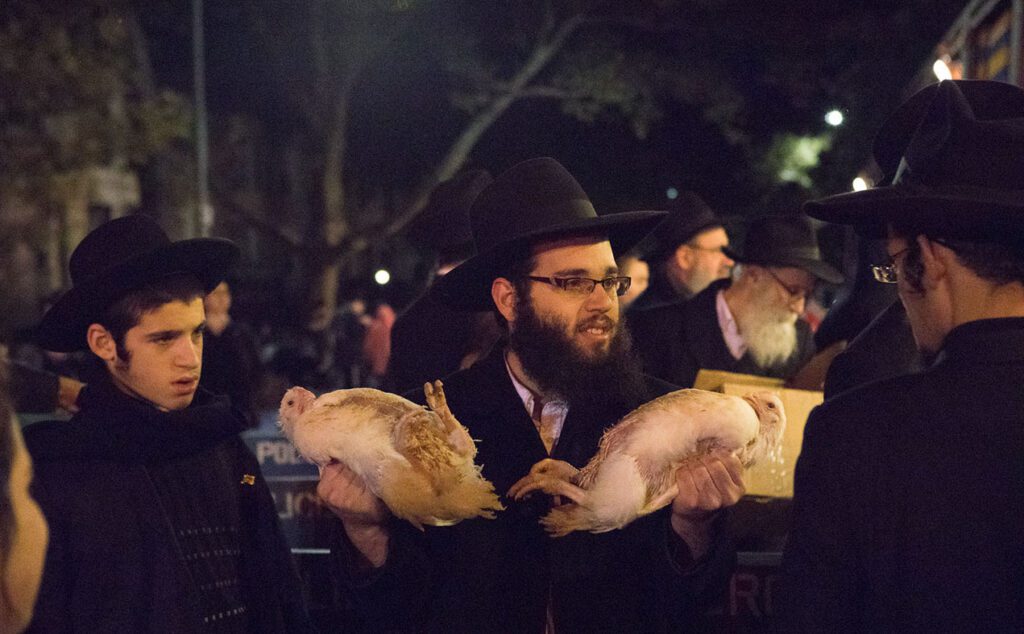Some of the most prominent and influential scholars in the history of Judaism have taken issue with the cruel and inhumane ritual of kapporos.
by Craig Shapiro
Warning: This article contains graphic descriptions and images of animal abuse.
Every year before Yom Kippur, countless chickens are slaughtered as part of the Jewish kapporos ritual. But this cruel and inhumane practice goes against Jewish teaching and basic compassion as expressed in the Bible.
In Genesis 9: 9–11, the Lord tells Noah and his sons that his covenant extends to “the birds, the livestock and all the wild animals … every living creature on earth.”
Psalm 145 leaves no doubt about the breadth of Hashem’s empathy: God “has compassion on all he has made.”
The Lord chose Moses to lead the Israelites out of Egypt because of the kindness that he showed to a lost lamb.
Judaism’s teachings about the treatment of animals are sacrosanct, but if there were ever any doubt that animals are to be treated humanely, the answer can be found in tsa’ar ba’alei chayim—the Torah’s mandate not to cause unnecessary suffering to any living creature.
Yet, next week, when Yom Kippur, the holiest day on the Jewish calendar, brings Jews together to reflect and pray for forgiveness for their transgressions of the past year, some will have already sinned in the name of atonement.
Kapporos, an ancient ritual in which young chickens are violently handled and their throats slashed as a means of reparation, flies in the face of tsa’ar ba’alei chayim. But that won’t stop some ultra-Orthodox communities from observing it again on the eve of Yom Kippur.
Roughly grabbed by their feet and wings, these gentle, inquisitive birds cry out in fear and pain as they’re swung over the heads of the participants while a prayer is recited. A kosher slaughterer then slits their throats and drops them into inverted traffic cones to bleed out.
Tradition holds that after their sins have been symbolically transferred to the chickens, the participants will be humbled by the birds’ ultimate “sacrifice” and will reflect on their transgressions.

But some of the most prominent, influential scholars in the history of Judaism have taken issue with kapporos. Maimonides and Joseph Karo argued that it should be abandoned, and Rabbi Solomon ben Abraham Aderet considered it a heathen superstition.
Rabbis today have also taken issue with it. In 2013, David Lau, the Ashkenazi Chief Rabbi of Israel, wrote to kapporos participants and suppliers to remind them that they have “a holy duty all year round to prevent any animal suffering and unnecessary pain,” explaining that such abuse would be “a mitzvah through a transgression.”
Last year, the organization Rabbis Against the Use of Chickens for Kapparot released a series of statements questioning the ritual.
Rabbi Chaim David Halevi, former Sephardic Chief Rabbi of Tel Aviv-Jaffa, addressed its hypocrisy: “Why should we, specifically on the eve of the holy day of Yom Kippur, be cruel to animals for no reason, and slaughter them without mercy, just as we are about to request the same compassion ourselves from the living God?”

Rabbi Shlomo Goren, former Chief Rabbi of Israel, wrote, “Repentance and charity can be better accomplished by using money instead of a slaughtered chicken.”
To that end, the Alliance to End Chickens as Kaporos is working to replace the birds with non-animal symbols of atonement.
The change can’t come too soon.
As an investigation by People for the Ethical Treatment of Animals revealed, the chickens suffer long before the kapporos ritual begins.
Chickens used for kapporos typically come from farms where they’re confined to massive, windowless sheds that hold as many as 20,000 birds. Intensive confinement in such large numbers prevents them from establishing a social structure—as a result, stressed and frustrated, they peck aggressively at each other’s feathers. Forced to live amid their own waste, they often develop respiratory illnesses because of its high concentration of ammonia.
Those who survive are trucked to kapporos sites in cramped, filthy cages and denied food, water and shelter from the searing heat. After they’re unloaded and the cages are stacked in the streets, the deprivation continues and they languish amid their own feces for hours or even days.
More than 50,000 young chickens are trucked in for rituals in New York City. Children assisting the slaughterers have been seen pulling the heads off the birds, stuffing them into garbage bags to bleed or suffocate to death and tossing the dying ones into piles. The carcasses are supposed to be given to the needy, but many are thrown in the trash.
Chickens were completely abandoned and left to die after one ritual. Days later, the ASPCA showed up and picked through all the carcasses to find any animals who had not yet died of dehydration or starvation.

As part of the Yom Kippur observance, congregations will read from the Book of Jonah. It speaks of repentance and reinforces the opening passage in Psalm 24: “The earth is the Lord’s, and everything in it, the world, and all who live in it.”
But first and foremost, it’s a reminder of God’s infinite mercy.
There is no better way for all Jews to celebrate their renewal than by showing mercy, too.
TAKE ACTION: Urge rabbinical leadership to denounce ritual chicken killing.
Craig Shapiro is a writer for the PETA Foundation. This article was produced by Earth | Food | Life, a project of the Independent Media Institute. Questions, comments, suggestions, submissions? Contact EFL editor Reynard Loki. Follow EFL on Twitter @EarthFoodLife.
Top image photo credit: Unparalleled Suffering Photography, courtesy United Poultry Concerns.
